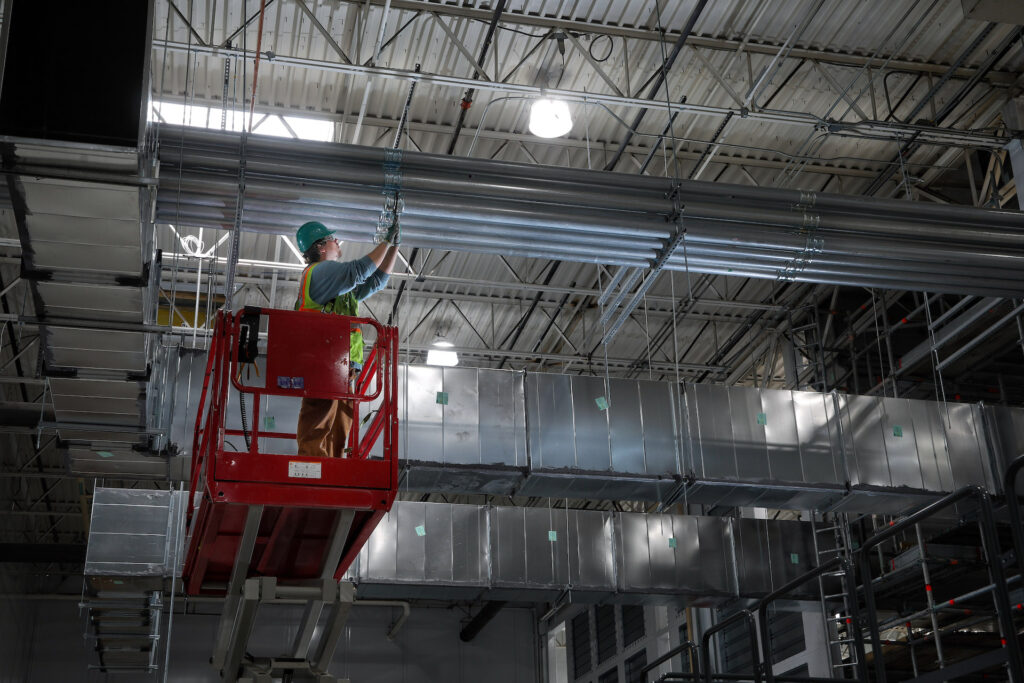
At Sack, we’re committed to hiring, training, growing and retaining the finest workforce in the industry, which is why we seek out opportunities to highlight and educate on ways to join the trades.
Careers in the trades offer numerous benefits from the practical (like paying well and letting you learn lifelong skills) to the abstract (they’re in demand and can’t be outsourced overseas).
But the primary benefit of a career in the trades may be how easy it is to get started. Compared to a 4-year college or university, training programs for the skilled trades are less expensive, take less time, and most often include hands-on, on-the-job training.
Depending on which trade interests you and where you plan on working, there can be different requirements for the amounts of training, education, and licensure requirements your career path needs. That’s why we’ve put together this guide to help you get started.
To form the foundation of your career in the trades, start by earning your high school diploma or GED. This will get you the most basic skills you’ll be applying in your career.
If you don’t already know what trade you want to go into, picking a trade is something you’ll want to spend some time on. Know your strengths, skills, and interests, and take time to research information specific to the trade that interests you the most: research the companies in your area who hire those trades and talk to people who work in that trade; familiarize yourself with specific training, licenses, or certificates you may need; and get an idea of how much the trade pays both when you’re first starting out and when you’ve mastered it.
There are many ways to start your career once you’ve chosen a trade, and none of them are wrong. But, one of the best options is to complete a trade school program or apprenticeship – or both. This combination of classroom learning and on-the-job training will prepare and qualify you to work under a licensed contractor like Sack.
Technical schools, trade organizations, community colleges, and other institutions offer degrees and certification courses that can serve as your first step into your trade. Depending on your trade and how far you want to go, these programs can last anywhere from a couple months to a few years. Also, not all trades require a formal education, so be familiar with what your trade needs before committing to an education program. Sometimes going straight into on-the-job apprenticeship is the way to go.
Finding an apprenticeship lets you work while training, and many also incorporate classroom learning. This on-the-job training develops your skills under the supervision of experienced tradespeople while you’re being paid for your work, and usually lasts about 4 years.
Apprenticeships are available through professional associations, training institutions, public and private companies, and more.
For aspiring electricians, plumbers, HVAC mechanics & technicians, millwright, riggers, pipefitters and welders, Sack offers the Registered Apprenticeship program through the Department of Labor, Independent Electrical Contractors and the Plumbing-Heating-Cooling Contractors Association.
Different trades may have different requirements for licensure, and some may not require any license at all. Other times, the area you work in may dictate your license, as states and cities may have different requirements.
In Georgia, entry-level HVAC workers do not need a license. HVAC installers, technicians, and mechanics can work under the supervision of a licensed contractor like Sack, installing, altering or repairing duct systems, control systems, or insulation without being licensed themselves. But, if you want to work on more complicated and specific systems, sometimes getting certified will be required.
Similarly, apprentice plumbers have no license or registration requirement. Journeyman plumbers need 3 years of work experience to apply and test for their license, and you can begin accumulating that experience as an apprentice or while you’re in trade school.
For electricians, after completing your time as an apprentice, an electrician in Georgia can legally work as a journeyman under a licensed contractor without supervision. Regardless of this, Sack does encourage our team members to get their electrical license and will help them achieve this.
Millwrights follow a similar path as other trades, completing an apprenticeship and technical instruction that includes learning welding, math, reading blueprints, and troubleshooting machinery. There is no specific license for millwrights in Georgia, and after completing their apprenticeship they are considered qualified in their trade.
One of the most significant goals in a tradesman’s career is reaching the level of journeyman. By successfully completing your apprenticeship, you’ll show that you have the skills and knowledge necessary to practice your trade without constant supervision and possibly under your own license.
No matter the trade you’ve chosen or the path you’ve taken, opportunities for further education, certifications, and learning additional skills can help you specialize, advance your abilities, and improve your pay.
Once you’re a journeyman, the next step is to continue working and learning and expanding your experience until you are a Master in your trade.
At Sack, we believe in working as a team and focusing on collective success rather than individual gain, and we look forward to new, passionate people joining our team.
Links to local education programs, apprenticeship opportunities, and more information on the trades
HVAC training and education accredited by HVAC Excellence in Georgia:
Programs accredited by Partnership for Air-Conditioning, Heating, Refrigeration Accreditation (PAHRA) in Georgia:
You can find a breakdown of the credit hour requirements for all of the programs listed above at HVACClasses.org
More links to help you find HVAC schools in Georgia:
IEC Atlanta Electrician Apprenticeship Program
We’re committed to hiring, training, growing and retaining the finest workforce in the industry. Join our growing team today.
